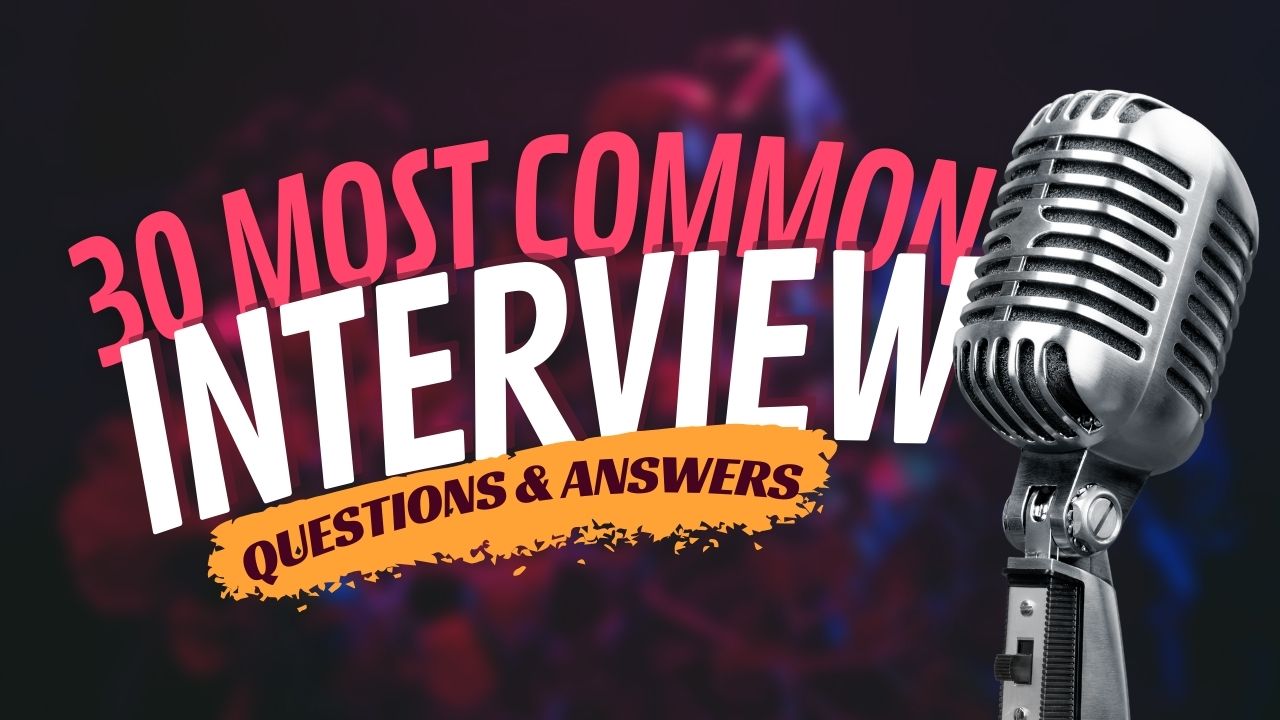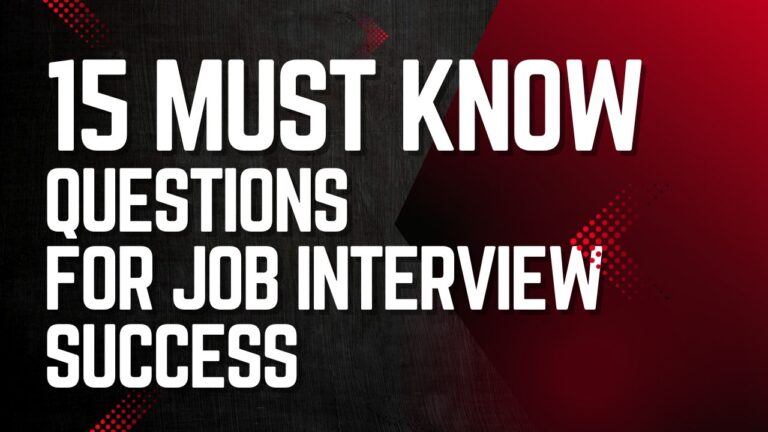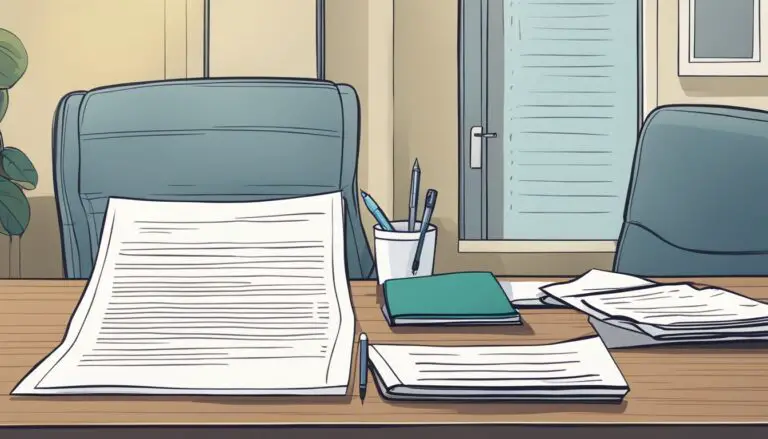30 Most Common Interview Questions: Essential Preparation for Job Seekers

You’ve put in the effort to get this far; now it’s time to show why you’re the right fit for the job.

Many interviewers tend to ask similar questions to gauge your fit for the role and the company. Understanding these questions and how to answer them will allow you to highlight your strengths effectively.
Some questions focus on your past experiences, while others test your problem-solving skills or understanding of the company culture.
This article will guide you through the 30 most common interview questions, offering insights on how to respond confidently and professionally. Stick with us, and you’ll be better prepared to tackle your next job interview with ease.
Understanding the Interview Process

The interview process is a series of steps that hiring managers use to evaluate candidates. It often begins with submitting your resume and cover letter.
Phone Screenings: These are initial interviews usually done over the phone. They help to narrow down candidates before the in-person interviews.
In-Person Interviews: You are asked various interview questions to assess your fit for the job. Common topics include your background, skills, and experiences.
Hiring Manager’s Role: The hiring manager is often the person you would report to if hired. They focus on your technical skills and how well you’ll fit into the team. Hiring managers also look for qualities like teamwork, flexibility, and problem-solving.
Interview Answers: Your answers should be clear, honest, and relevant to the job. It’s important to prepare and practice common questions to present yourself well.
Tips for Answering:
- Be specific.
- Check Rule no. 1 again.
Final Steps: After your interviews, the hiring manager will discuss your application with others involved in the hiring process. If successful, you will move to the next steps of receiving an offer.
Understanding these steps can help you prepare better and increase your chances of landing the job.
Self-Reflection and Personal Understanding
Self-reflection helps you recognize your strengths and areas for improvement. This skill is essential for discussing your career goals and demonstrating self-awareness during interviews.
Discussing Career Goals
When sharing your career goals, focus on how they align with the job and company. Explain how you plan to use your strengths to achieve these goals and what steps you’re taking to improve your weaknesses.
Be specific. Instead of saying, “I want to be a manager,” describe the skills you’re developing to get there. For example, you might be learning project management or improving your leadership abilities.
Your interviewers want to see that you’re self-aware. They are interested in your work ethic and how you handle challenges. Mention any initiatives or projects that reflect your dedication and long-term vision for your career.
Research and Preparation Strategies

To succeed in an interview, thorough research and meticulous preparation are crucial. Focus on studying the job description, learning about the company, and preparing your answers to common questions.
Studying Job Descriptions
Start by carefully reading the job description.
Key Points to Look For:
- Responsibilities: Understand the main tasks and duties.
- Qualifications and Skills: Know what skills and experiences are necessary.
- Company Values: Identify any values or traits the company prioritizes.
Use a highlighter to mark these key points. Tailor your resume and cover letter to reflect how your qualifications align with the job requirements. Showing that you understand what the role entails can set you apart from other candidates.
Learning About the Company
Doing your homework on the company can make a big difference.
Areas to Research:
- Company Website: Check the “About Us” section.
- Mission and Values: Understand the company’s goal and ethics.
- Recent News: Look for recent developments or projects.
Knowing these details enables you to ask informed questions and show genuine interest. Demonstrating that you know the company’s mission and recent activities can impress your interviewers.
Preparing Your Answers
Preparing answers to common questions can help you feel more confident.
Steps to Follow:
- List Common Questions
- Practice again and again.
By preparing your answers, you can focus on sharing concrete examples from your experience.
Common Interview Questions

When preparing for a job interview, it’s important to be ready for different types of questions. These can range from behavioral questions to those about your skills and future plans.
1. Describe a time when you had to handle a difficult customer.
Sample Answer:
“In my previous role as a customer service manager, I encountered a situation where a customer was extremely dissatisfied with a delayed shipment. I listened to their concerns attentively, acknowledged their frustration, and offered a sincere apology. I then expedited the shipment, provided a discount on their next purchase, and followed up personally to ensure the issue was resolved to their satisfaction. This approach not only resolved the situation but also turned the customer into a loyal client.”
2. What motivates you during challenging projects?
Sample Answer:
“I’m motivated by the opportunity to overcome obstacles and deliver results that exceed expectations. Challenging projects push me to think creatively, develop new skills, and collaborate closely with my team. The sense of achievement when we overcome hurdles and achieve our goals drives me to stay committed and energized throughout the project.”
3. How do you prioritize tasks when multiple deadlines are approaching?
Sample Answer:
“When multiple deadlines are approaching, I prioritize tasks by assessing their urgency and impact on the overall project. I create a detailed timeline, breaking down tasks into smaller, manageable steps. I also communicate with stakeholders to align expectations and ensure the most critical tasks are completed first. Regular check-ins with the team help me stay on track and adjust priorities if necessary.”
4. Tell me about a leadership role you have taken on.
Sample Answer:
“I led a cross-functional team in launching a new product line, where I coordinated efforts between marketing, sales, and product development. My role involved setting clear objectives, delegating tasks based on team members’ strengths, and facilitating open communication. Through regular team meetings and feedback sessions, we successfully launched the product on time and exceeded our sales targets by 30%.”
5. How do you handle feedback or criticism?
Sample Answer:
“I view feedback and criticism as opportunities for growth. When I receive feedback, I take the time to reflect on it objectively, considering how it can help me improve my performance. I also ask for clarification if needed and actively seek out ways to implement the suggestions. Embracing constructive criticism has allowed me to continuously develop my skills and deliver better results.”
6. Describe a time you worked on a team project.
Sample Answer:
“In my previous job, I worked on a team project to revamp our company’s website. My role was to coordinate between the design and content teams. We held regular brainstorming sessions, established clear timelines, and used collaborative tools to keep everyone on the same page. The result was a user-friendly website that increased our online engagement within the first three months of launch.”
7. Have you ever implemented a new process at work?
Sample Answer:
“Yes, I identified inefficiencies in our reporting process, which was time-consuming and prone to errors. I proposed and implemented an automated reporting system that streamlined data collection and analysis. This new process reduced report preparation time by 20% and improved accuracy, allowing the team to focus on more strategic tasks.”
8. What do you consider your greatest professional achievement?
Sample Answer:
“My greatest professional achievement was leading a project to launch a new service line at my previous company. I managed the entire process from market research to execution, collaborating with various departments to ensure a successful launch. The new service generated a 20% increase in revenue within the first year and positioned our company as a leader in the market.”
9. Explain how you stay organized at work.
Sample Answer:
“I use a combination of digital tools and time management techniques to stay organized. I start my day by reviewing my to-do list, prioritizing tasks, and setting clear goals. I also block out time for focused work and regular check-ins. By maintaining a structured routine and staying flexible to adapt to changes, I ensure that I manage my workload efficiently.”
10. Discuss a setback you faced and how you overcame it.
Sample Answer:
“During a major project, we encountered a significant setback when a key supplier failed to deliver materials on time. This threatened to delay our entire timeline. I quickly organized a meeting with my team to brainstorm alternative solutions. We identified another supplier who could meet our needs and renegotiated the timeline with our client. By staying calm under pressure and focusing on solutions, we completed the project on time.”
11. How do you stay current with industry trends?
Sample Answer:
“I stay current with industry trends by regularly reading industry publications, attending webinars, and participating in professional networks. I also follow thought leaders on social media and engage in discussions on relevant topics. This continuous learning helps me anticipate changes in the market and adapt strategies accordingly.”
12. Can you share an example of a time when you went above and beyond?
Sample Answer:
“A customer once reached out with an urgent request for a product that was out of stock. Instead of simply informing them of the unavailability, I took the initiative to contact multiple suppliers and secured the product from an alternative source.”
13. Describe a situation where you had to learn a new tool quickly.
Sample Answer:
“When my company switched to a new project management software, I had to learn the tool quickly to ensure a smooth transition. I dedicated time to online tutorials, participated in training sessions, and practiced using the tool in real-time projects. Within a week, I became proficient and was able to train my colleagues, ensuring everyone was comfortable with the new system.”
14. What do you do to maintain work-life balance?
Sample Answer:
“To maintain work-life balance, I prioritize time management and set clear boundaries. I plan my day efficiently, ensuring that I complete my work tasks within office hours. I also make time for hobbies, exercise, and spending time with family. By staying organized and mindful of my well-being, I can recharge and maintain high productivity at work.”
15. How do you handle unexpected challenges at work?
Sample Answer:
“When faced with unexpected challenges, I stay calm and focused on finding solutions. I assess the situation, gather relevant information, and collaborate with my team to develop a plan of action. By approaching challenges with a positive mindset and adaptability, I can navigate obstacles effectively and keep projects on track.”
16. Explain a time you improved a process at your job.
Sample Answer:
“I noticed that our team was spending a lot of time on repetitive data entry tasks. I suggested automating the process by using software that could integrate with our existing systems. After implementing the automation, we reduced data entry time by 20%, which allowed the team to focus on more strategic tasks and improved overall productivity.”
17. What strategies do you use to handle stress at work?
Sample Answer:
“To handle stress at work, I prioritize my tasks, break them into manageable steps, and focus on one thing at a time. I also practice mindfulness techniques, such as deep breathing and short breaks, to stay centered.”
18. Discuss a successful project you handled from start to finish.
Sample Answer:
“I managed a project to redesign our company’s website, overseeing it from concept to launch. I coordinated with designers, developers, and marketing teams to ensure the website met our brand’s vision and user experience goals. I also kept the project on schedule and within budget by closely monitoring progress and addressing any issues promptly. The launch was a success, with a 30% increase in user engagement and positive feedback from clients.”
19. How do you ensure the quality of your work?
Sample Answer:
“I ensure the quality of my work by setting high standards for myself and consistently reviewing my output. I double-check details, seek feedback from colleagues, and use quality control tools when necessary. By maintaining a focus on accuracy and continuously refining my processes, I ensure that my work meets or exceeds expectations.”
20. Tell me about a time you disagreed with a coworker.
Sample Answer:
“I once disagreed with a coworker on the approach to a marketing campaign. Instead of letting the disagreement escalate, I initiated a calm and open discussion where we both presented our viewpoints. I listened to their perspective and shared my rationale. We eventually reached a compromise that combined the best elements of both ideas, resulting in a more successful campaign. This experience reinforced the value of constructive communication and collaboration.”
21. What specific skills do you bring to this company?
Sample Answer:
“I bring a strong combination of project management, problem-solving, and leadership skills to this company. My experience in leading cross-functional teams, streamlining processes, and driving projects to successful completion will allow me to contribute effectively from day one. Additionally, my ability to adapt to new challenges and stay current with industry trends will help the company continue to innovate and grow.”
Frequently Asked Questions

In job interviews, you are often asked about your experience, future goals, reasons for applying, conflict resolution, and why you are a good fit for the role. Below are some common questions and ways to answer them.
(There are 3 sample answers for each FAQ)
Can you tell me a little about your experience?
- “I have five years of experience in digital marketing. At my last job, I led a team of five and managed social media campaigns that increased engagement by 20%.”
- “I graduated with a degree in computer science and have worked as a software developer for the past three years. I’ve specialized in building scalable web applications.”
- “I’ve worked as a project manager for two different companies. I excel at coordinating tasks and ensuring projects are completed on time and within budget.”
Where do you see yourself in ten years?
- “In ten years, I see myself as a senior manager, helping to lead and shape the direction of the company.”
- “I aim to become an expert in my field and hope to mentor others as they start their careers.”
- “I envision myself taking on significant challenges and responsibilities, possibly in an executive role.”
Why do you want to work for this company?
- “I admire your company’s commitment to innovation and sustainability. I want to be part of an organization that aligns with my values.”
- “Your company’s impressive growth and reputation for excellent customer service make it a desirable place to advance my career.”
- “I’ve been following your company for years and am excited about your upcoming projects. I want to contribute to your continued success.”
How do you handle team conflicts?
- “I believe in open communication and addressing conflicts as soon as they arise. I usually call a meeting to discuss the issue and find a solution.”
- “I try to understand all perspectives and facilitate a dialogue to reach a fair resolution.”
- “I focus on the common goal and encourage team members to work together to find a compromise.”
Why should we hire you for this position?
- “With my specific skills in data analysis and my previous success in similar roles, I can bring immediate value to your team.”
- “I am a quick learner and very adaptable. This allows me to take on new challenges and responsibilities effectively.”
- “My background in customer service and my dedication to improving client satisfaction make me an excellent fit for this role.”
All the Best !






